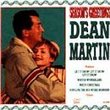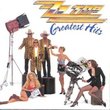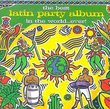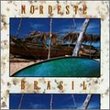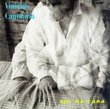| All Artists: Alfredo Catalani, Renata Tebaldi, Mario del Monaco, Fausto Cleva, Piero Cappuccilli, Justino Diaz, Alfredo Mariotti, Stefania Malagu, Monte Carlo National Opera Orchestra, Lidia Marimpietri Title: Catalani: La Wally / Tebaldi, del Monaco, Cappuccilli; Cleva Members Wishing: 0 Total Copies: 0 Label: Decca Release Date: 2/13/1990 Genre: Classical Style: Opera & Classical Vocal Number of Discs: 2 SwapaCD Credits: 2 UPC: 028942541726 |
Search - Alfredo Catalani, Renata Tebaldi, Mario del Monaco :: Catalani: La Wally / Tebaldi, del Monaco, Cappuccilli; Cleva
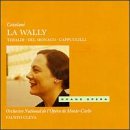 | Alfredo Catalani, Renata Tebaldi, Mario del Monaco Catalani: La Wally / Tebaldi, del Monaco, Cappuccilli; Cleva Genre: Classical
|
Larger Image |
CD DetailsSimilarly Requested CDs
|
CD ReviewsA GREAT TEBALDI RECORDING OF AN INTERESTING OPERA lesismore26 | Chicago, Illinois USA | 07/05/1999 (5 out of 5 stars) "Catalani's "La Wally" is a turn-of-the-century "verismo" opera, and one that Tebaldi began singing fairly early in her career. She opened the 1953 La Scala season in it (along with Mario del Monaco), and continued to sing it on various occasions throughout her distinguished career. "La Wally" is not a great opera, but it has many beautiful and engaging things in it, not least of which is the celebrated aria (featured in the film "Diva) "Ebben? n'andro lontano", which is heard near the beginning of the opera. There is also a highly dramatic soprano/tenor duet at the finale, and some really attractive music in between. This wonderful London recording was made rather late in Tebaldi's career (1969), but she is in outstanding vocal form here. Her voice is large, ripe, powerful, and beautiful enough for one to think that this recording represents prime Tebaldi, which in this instance, it really does. This was an operatic role that suited her Italian temperment like a glove. Mario del Monaco is also caught in late-career form, and while he shows more vocal wear and tear than Tebaldi, he still is in good enough shape to use his still-powerful voice to good effect. He is a formidable presence here, and an ideal partner for Tebaldi (they recorded many operas together, this being the last). All of the supporting singers do a good job here, and Cleva conducts a warm and compelling performance. If one is interested in exploring this very interesting opera, this is the recording to get.For Tebaldi fans, it's a must." "La Wally" is a hoot! L. E. Cantrell | Vancouver, British Columbia Canada | 01/22/2004 (5 out of 5 stars) "I am in general agreement with the previous Amazon reviewers. Yes, this is a late recording for Tebaldi and del Monaco, but the plain fact is that they both sound just fine -- particularly when compared to the lesser operatic lights of today.This is not a familiar work for most opera lovers. That is a shame because it is a hoot! Where else is there a yodeling aria? In what other opera does the tenor despise the soprano until almost the end? And, I ask you, where can you find a tenor so dumb that he falls off a cliff TWICE before the curtain falls?"La Wally"--as they say up here in the Frozen North, "Ya gotta love it!"" You betcha! Mark McCue | Denver, CO USA | 07/24/2000 (5 out of 5 stars) "The previous reviewer stole most of my thunder, but I'll rumble a way just a bit because this is an exceptional reissue. Wally is such an affecting opera that you forgive its weaknesses of structure and its slightly scant story. And having two distinguished singers giving their farewells in it is a most appropriate and heartfelt gesture on the part of the producers. We listen around Wally as we do around Tebaldi. It's a remarkable assumption of a role that is too often snubbed.Maestro Capuana was rounding up his distinguished career, too, and the Paul Paray trained Monte Carlo Orchestra gives him a performance that's a salutory and a salutation. While there are some felicities missing here that come to the fore in some of the RAI tapings of Tebaldi in this part, this is a "must have" for Italianists of all ages and stripes."
|

 Track Listings (17) - Disc #1
Track Listings (17) - Disc #1